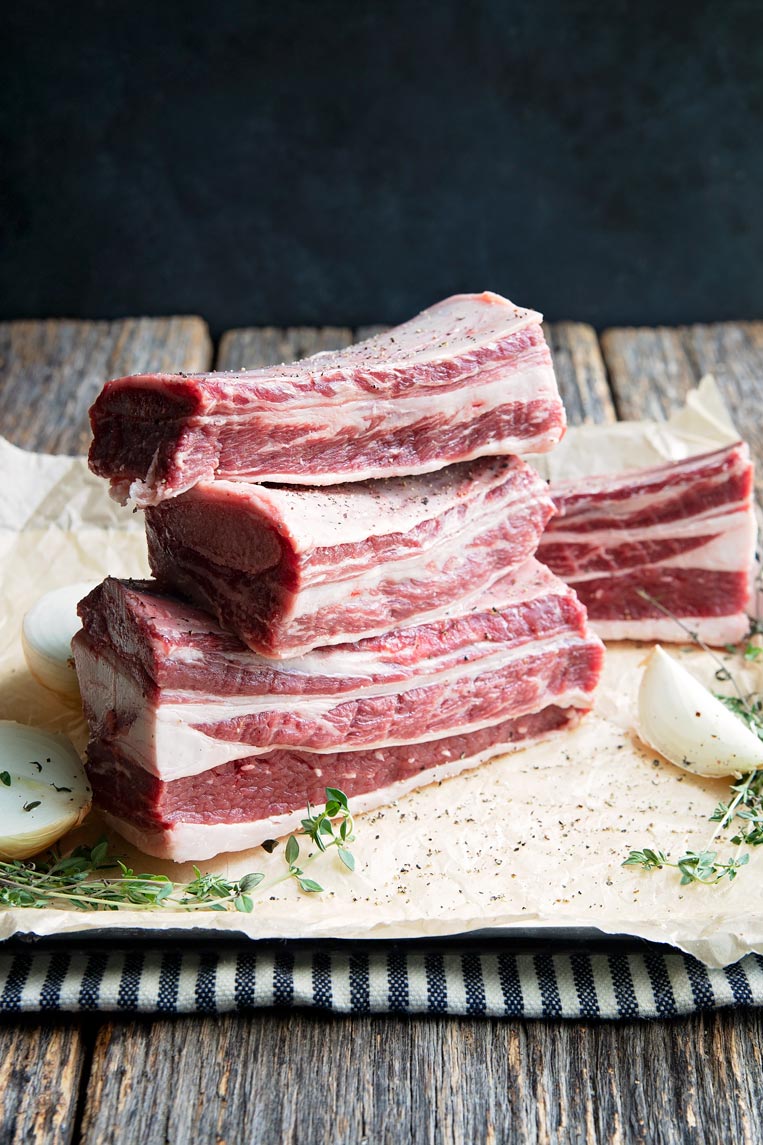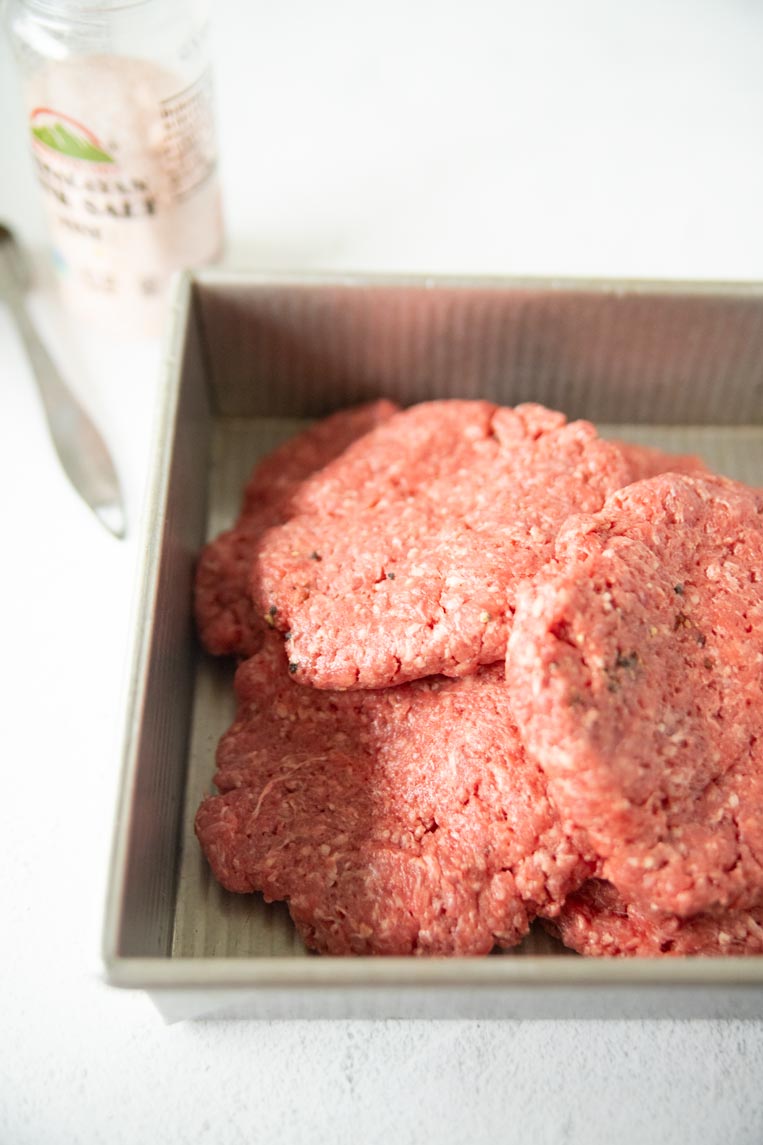Grass Fed Beef as Opposed to
Grass fed beef vs grain fed: Which one tastes better and is better for you? Cut through the hype and get your information straight from an unbiased source. As a life-long beef farmer and someone who also cares about what's good for you–I'll give it to you without any biased slant.

What does "grass fed" or "grain fed" really mean?
First, know that the majority of a cow's diet is grass and hay. For cows who are grain fed, it's only 10% of a cow's total diet during their lifetime–the rest is still grass. In warm weather cows eat pasture and in cold weather months cows are fed hay (which is dried grass if you didn't know).
Cows that are grass fed only eat hay or pasture throughout their life and are termed "grass fed".
Cows that eat grass and also are fed grain either to supplement their hay and pasture allotment or closer to the end of their life before slaughter are termed "grain fed".
However these terms only refer to a cow's diet and not much about its lifestyle. They tell you nothing about if that cow was in a pen and fed exclusively grass/hay. It doesn't tell you if that cow was raised by organic or certified naturally grown standards. It doesn't tell you if it was healthy at the time of slaughter.
Grass fed beef vs. grain fed also doesn't tell you if that cow has had antibiotics or growth hormones during its life if that matters to you.
Remember: The terms grass fed or grain fed tell you nothing about how that cow was raised or its health at slaughter.
Why does everyone promote grass fed beef?
Because it's trendy and many people do believe it's healthier–but there's always a catch or two. From a macros and nutritional standpoint, grass fed and grain fed beef are strikingly similar. According to the National Beef Checkoff–a source for beef information that's non biased–here are the nutritional statistics for grass fed beef vs. grain fed:
Grass Fed
Protein: 21.8
Zinc: 3.7
Iron: 1.8
Total fat: 2.9
Grain Fed
Protein: 22
Zinc: 3.8
Iron: 1.6
Total fat: 5.2
Fat amounts on grain fed beef will be higher because grain fed cows have more marbling or fat throughout the meat. You can see that both grass and grain fed are very similar in protein, zinc and iron levels and beef from either source contains more than 10 different essential nutrients. There's not the big difference in nutrition everyone would want you to believe.
The omega 3 vs 6 debate: Why some say grain fed is unhealthy
So here's where the debate comes in. Americans as a whole eat way too many omega-6 fatty acids. Say a big thank you to vegetable oil and processed food for that one. Everyone wants to blame the beef for it when no one is looking at the amount of seed oils (canola, vegetable, safflower and sunflower) and fast food that's fried in it that we're eating in this country.
Eating omega-6's in moderation may not be an issue as long as they are outweighed by the inflammatory-fighting healthy benefits of omega-3 fatty acids. Your diet should be predominantly omega-3 fats like those from fish, avocados, and nuts and seeds.
Not surprisingly, cattle that are grain fed are higher in omega-6 fats mostly because the grain sources they are fed like corn and soybeans are naturally high in those fats. So people like to say that grain fed beef is unhealthy because of its omega-6 ratios. Grain fed beef has a ratio of omega 6 to omega 3 of 9:1. Grass fed has a ratio of 2:1. So there are 9 times more omega-6 fats in grain fed compared to just 2 times as many in grass fed.
I don't think this is an issue if you aren't eating beef three times a day at every meal.

How does grass fed beef vs grain fed beef taste?
Anyone who has grown up eating local beef knows the answer to this. Grass fed beef usually tastes bland, and feels dry and tough because it's so much lower in fat. It's easy to over cook it. Fat is flavor and when that's taken away, the flavor of the beef really suffers.
Grain fed beef has more fat and that fat adds juiciness and flavor. It's not a gamey taste–just richer than grass fed and I think it's sweeter.
Most beef farmers I know prefer to eat grain fed beef, but we won't pass up a grass fed burger if it's offered. I can assure you that I can tell you what kind of beef I'm eating after just one taste.
What matters more when it comes to buying beef
I think what matters more is the life of the cow. How it was raised (including what it was fed) and what medications it took. Did that cow live on green pastures with fresh water and a place to graze? Was it healthy at slaughter or had it been sick lately? Your store bought beef will never be able to answer those questions.
Cows on our farm only get antibiotics if they are sick–just like you do–and those cases are very rare. I think it's been over 6 years since our main herd cattle needed any medication. Their calves (the only cattle we sell to market) 99% of the time never take any antibiotics. I don't know any farmers who give their cows medications "just in case" or on any kind of daily basis. We don't medicate their feed. Our cows are corn-fed and we have no problem with that.
When you source your beef, get it local, and get it from a farmer so you can ask questions. Find out about the cow's life and get one that's strong, has shiny fur, looks healthy and is out on pasture.
So where does beef at the grocery store come from?
It can come from a few places. In 2020, for every pound of US beef this country exported, we imported 1.5 pounds. And that's just the meat itself we were tracking. The number of imported cattle is even higher and the beef is coming from Canada, Australia and much of Mexico and Latin America.
Once the meat passes inspection here in the United States, it gets a "product of the USA" label even if it wasn't raised here. At the time of this article's creation, the USDA was looking at possibly changing this loophole.
US raised beef is largely produced on farms just like mine all over the country then those cattle are sold and shipped out West to a feedlot facility where they are grain fed a scientifically balanced diet for a specific time before going to one of the big 4 meat processors in the United States. These 4 companies process, control and ship 85% of all beef in the United States.
And that's the meat you find in your grocery store. Processed and packed in black plastic containers in long strings you never can seem to break up when it cooks. You don't know where it came from and next to nothing about its life.
That's your grain fed supermarket meat.

Our personal story with grain fed beef
Life is all about balance and eating too much of any one food can be unhealthy in the end. We don't eat beef exclusively (that would be crazy) but we do eat it 3 to 4 times a week at our house as part of our commitment to eating real, whole foods. We eat grain fed, but it's locally sourced.
When I was stricken with a paralyzing autoimmune disease in 2022 and sentenced to a wheelchair, I began a strict regimen to rehab my body with food as my medicine. Beef was a big part of my plan due to its amazing nutritional content. I'm proud to say I'm out of my wheelchair and thriving and a good burger (off the bun) is a regular meal for me.
My husband lowered (yes, I said lowered) his cholesterol 32 points on a diet of red meat, butter and eggs. He's also lost more than 25 pounds on the same diet. We took out processed food, sugar, and refined oils instead. Amazing!
Want what a beef farmer wants, and its this
A healthy cow.
A locally raised cow.
A cow that was healthy when it was slaughtered.
A cow that enjoyed green pasture and clean water.
Maybe (big maybe) an organic cow.
Better food is a journey. Do what you can, then do better. Don't let anyone make you feel bad for whatever choice you make and can afford.
Sources for grass fed and grain fed beef
There are so many amazing places to get great beef these days!
- Start by looking for local meat processors near you. Call them and ask them if they have anyone who provides beef to them and then call those farmers and ask questions. We source our beef from a local Amish slaughter house and it's just wonderful. If you're in Kentucky, Showalter's is your go-to.
- Websites like Eat Wild may connect you with a farmer in your area who will deliver your cow to the processor of your choice.
- Porter Road is a Tennessee based butcher shop committed to great meat. It's "pasture raised" but there are no details about grain. You can ask them but based on the delicious taste, I feel sure it's grain fed.
- We ordered Moink Beef for years and years and loved it. I really liked that they can tell you exactly which small farm your beef came from and it helps family farms.
- Butcher Box is also super popular. I've never tried it, but lots of people like it.
**I fully expect this to be a very polarizing topic. Please keep your comments civil. Thanks!
Source: https://feastandfarm.com/grass-fed-beef-vs-grain-fed/
0 Response to "Grass Fed Beef as Opposed to"
Post a Comment